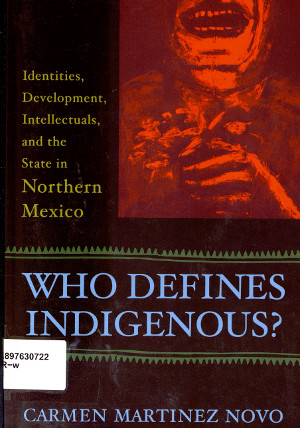Número de ficha: 137776
Me gusta
0
No me gusta
0
Para calificar el registro, es necesario acceder al sistema.
Ir a la página de acceso
- ISBN
- 978-0-8135-3669-9
- Clasificación DEWEY
- 305.897630722 MAR-w
- Autor
- Martínez Novo, Carmen 1966- , autor
- Título
- Who defines indigenous? : identities, development, intellectuals, and the state in northern Mexico / Carmen Martínez Novo
- Pie de imprenta
- New Brunswick, N.J. : Rutgers University Press , c2006
- Descripción
- xi, 187 páginas : mapas ; 24 cm.
- Tipo de medio digital o análogo
- sin medio rdamedia
- Medio de almacenamiento
- volumen rdacarrier
- Nota de contenido
- Introduction -- Mixtec communities at the Mexican border -- The making of vulnerabilities : indigenous day laborers in Mexico's neoliberal agriculture -- "We are against the government, although we are the government" : state institutions and indigenous migrants in Baja California in the 1990s -- Representations of indigenous women street vendors in Tijuana -- Race, maternalism, and community development -- Conclusion: Cultural difference and democracy.
- Nota de Resumen
- For years, conventional scholarship has argued that minority groups are better illegible] when the majority groups that absorb them are willing to recognize and illegible] the preservation of indigenous identities. But is the reinforcement of ethnic illegible] among migrant groups always a process of self-liberation? In this surprising illegible] Carmen Martinez Novo draws on her ethnographic research of the Mixtec illegible] migration from the southwest of Mexico to Baja California to show that illegible] the push for indigenous labels is more a process of external oppression than illegible] minority empowerment. In Baja California, many Mixtec Indians have not made efforts to UNK] themselves as a coherent demographic. Instead, Martinez Novo finds that the push for indigenous illegible] in this region has come from local government agencies, economic elites, intellectuals, and other illegible] agents. Their concern has not only been over the loss of rich culture. Rather, the pressure to illegible] indigenous identity has stemmed from the desire to secure a reproducible abundance of cheap illegible] labor. Indian means illegible] commercial agriculture low-wage worker or an urban informal street vendor - an identity that interferes their goals of social mobility and economic integration. Bringing a critical new perspective to the complex intersection among government and scholarly illegible] economic development, global identity politics, and the aspirations of local migrants, this provocative illegible] is essential reading for scholars working in the fields of sociology, anthropology, and ethnic studies.
- Fuente de adquisición
- Sandi ; compra ; 12-01-2017
- Materia
- Mixtecas -- México -- Tijuana (Baja California) -- Identidad Étnica
- Mixtecas -- México -- Tijuana (Baja California) -- Condiciones Sociales
- Mixtecas -- México -- Tijuana (Baja California) -- Condiciones Económicas
- Empresas Indigenas -- México -- Tijuana (Baja California)
- Cultura Popular y Globalización -- México -- Tijuana (Baja California)
- Materia Nombre Geográfico
- Tijuana (Baja California, Mexico) -- Ethnic relations.
| etiq. | info |
|---|---|
| 000 | 02199cam 22003614a 4500 |
| 001 | 13872944 |
| 005 | 20080116111856.0 |
| 006 | a |
| 008 | 050215s2006 njub rb 001 0 eng |
| 010 | |a 2005004407 |
| 020 | |a978-0-8135-3669-9 |
| 040 | |aDLC|cDLC|dDLC|dCOLMICH |
| 082 | 00|a305.897630722|bMAR-w |
| 100 | 1 |aMartínez Novo, Carmen|d1966-|eautor |
| 245 | 10|aWho defines indigenous?|bidentities, development, intellectuals, and the state in northern Mexico |cCarmen Martínez Novo |
| 260 | |aNew Brunswick, N.J. |bRutgers University Press|cc2006 |
| 300 | |axi, 187 páginas|bmapas |c24 cm. |
| 336 | |atexto|2rdacontent |
| 337 | |asin medio|2rdamedia |
| 338 | |avolumen|2rdacarrier |
| 505 | 0 |aIntroduction -- Mixtec communities at the Mexican border -- The making of vulnerabilities : indigenous day laborers in Mexico's neoliberal agriculture -- "We are against the government, although we are the government" : state institutions and indigenous migrants in Baja California in the 1990s -- Representations of indigenous women street vendors in Tijuana -- Race, maternalism, and community development -- Conclusion: Cultural difference and democracy. |
| 520 | |aFor years, conventional scholarship has argued that minority groups are better illegible] when the majority groups that absorb them are willing to recognize and illegible] the preservation of indigenous identities. But is the reinforcement of ethnic illegible] among migrant groups always a process of self-liberation? In this surprising illegible] Carmen Martinez Novo draws on her ethnographic research of the Mixtec illegible] migration from the southwest of Mexico to Baja California to show that illegible] the push for indigenous labels is more a process of external oppression than illegible] minority empowerment. In Baja California, many Mixtec Indians have not made efforts to UNK] themselves as a coherent demographic. Instead, Martinez Novo finds that the push for indigenous illegible] in this region has come from local government agencies, economic elites, intellectuals, and other illegible] agents. Their concern has not only been over the loss of rich culture. Rather, the pressure to illegible] indigenous identity has stemmed from the desire to secure a reproducible abundance of cheap illegible] labor. Indian means illegible] commercial agriculture low-wage worker or an urban informal street vendor - an identity that interferes their goals of social mobility and economic integration. Bringing a critical new perspective to the complex intersection among government and scholarly illegible] economic development, global identity politics, and the aspirations of local migrants, this provocative illegible] is essential reading for scholars working in the fields of sociology, anthropology, and ethnic studies. |
| 541 | |aSandi|ccompra|d12-01-2017 |
| 598 | |aCEA |
| 598 | |aENERO2017 |
| 650 | 0|aMixtecas|zMéxico|zTijuana (Baja California)|xIdentidad Étnica |
| 650 | 0|aMixtecas|zMéxico|zTijuana (Baja California)|xCondiciones Sociales |
| 650 | 0|aMixtecas|zMéxico|zTijuana (Baja California)|xCondiciones Económicas |
| 650 | 4|aEmpresas Indigenas |zMéxico|zTijuana (Baja California) |
| 650 | 0|aCultura Popular y Globalización|zMéxico|zTijuana (Baja California) |
| 651 | 0|aTijuana (Baja California, Mexico)|xEthnic relations. |
